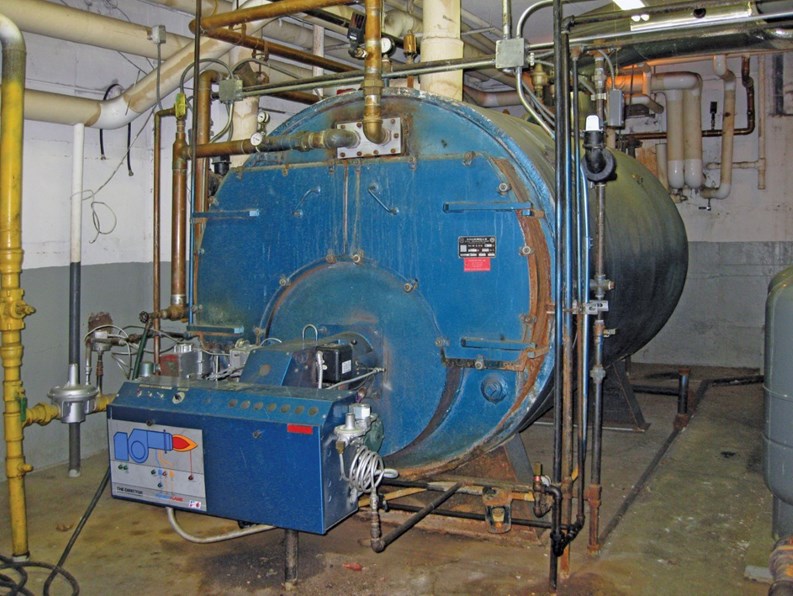A building is, in many ways, like a body. If its residents are the soul, then certainly the mechanical systems that keep it running are at its heart. And just as one cares for one’s body by eating right and exercising, management must care for those mechanical systems, ensuring they function efficiently and well throughout their life span.
With the proper amount of planning and foresight, caring for large-scale building systems can be a relatively painless process. Knowing the ins-and-outs of these machines—how they work, how to baby them and make them last—can be invaluable in saving money, time and frustration down the road. It’s all about knowing what to expect and preparing for it as best as one can.
Preparation is Everything
The key to preserving systems, such as the boiler or the HVAC system or the outdoor irrigation system, is to care for them from day one. “Maintenance is vitally important,” says engineer Russ Fernandes of Becht Engineering in Liberty Corner. “The typical life expectancies of equipment can be surpassed dramatically if they’re cared for properly.”
Reserve Specialist Michael Callahan of Advanced Reserve Solutions, Inc. in Dover, New Hampshire, agrees. “Putting off maintenance will wear out equipment faster and age the equipment faster,” he says. “Changing the oil, changing filters, greasing parts can all prolong useful life expectancy and could save buildings money over a long period of time. You want to have both a maintenance and a preventative maintenance system.”
Each piece of equipment has a manual with scheduled maintenance suggestions included, says Fernandes. It’s important to adhere to that schedule, whether through a licensed professional who specializes in that specific piece of equipment or through the building’s “super.” Depending on the size of the property and budget considerations, some HOAs may choose to train their maintenance staff to handle that scheduled maintenance rather than calling in an outside contractor each and every time.
Whoever does the work, though, it’s quality work that must be done.
“It’s fine for a superintendent to make repairs, as long as the super is properly certified to perform those repairs,” says William Pyznar, PE and a partner at The Falcon Group, Engineering and Architects.What is very important, is making sure that all repairs, maintenance, guidelines and materials are in accordance with the warranty that’s provided, especially with new systems because your don’t want to void any warranties.”
It’s rarely a good idea to put maintenance off, if only for the simple logic of “Murphy’s Law.” “Boilers only fail in winter, and the ac only fails in summer,” Fernandes says.
Most industry professionals agree that prolonged duration between routine maintenance visits to save dollars is unwise.
“You really have to look at what you’re talking about. Some items require maintenance once or twice a year, it really depends on the particular piece of equipment that you are talking about. But you certainly don’t want to defer it beyond what is recommended. It’s recommended for a reason,” says Pyznar.
In terms of the major problems which can occur when routine maintenance has been deferred beyond the recommended, Pyznar says the procured costs will be “a drop in a the bucket for routine maintenance, as opposed to a premature [system] failure. In addition, there’s the quality of life issue when your pumps fail and the building has no water or your roof is leaking and you have damages in addition to just the roof. Then you’ll have people with mold, potential lawsuits and other surprises.”
So if it looks like a boiler is acting up in the late winter months, it’s better to nip the problem in the bud come springtime than it is to wait until winter rolls around again and simply hope for the best. Cold owners are unhappy owners.
Aside from maintenance issues, a number of circumstances can factor into the life span of a building system. Location of the equipment can play a larger role than some might think, especially for equipment that is stored outside near water and may be susceptible to the effects of moisture, storms, and blowing sand.
Quality of product and quality of installation can also make a difference. Perhaps previous board members were forced to purchase piping that was not up to the building’s usual standards, or perhaps they hired an installer who made a few mistakes over the course of the job; both of these issues can come back to haunt an HOA later.
Building size also can factor into how long a system lasts. “Is this system the proper size for the building?” says Callahan. It’s an important question because “the strain of trying to serve a building that’s too large for the system can prematurely age that system.” That means that a boiler designed to serve a 20-unit building that is instead installed in a 40-unit building will be overtaxed in trying to function at twice its prescribed capacity—a distinct recipe for failure.
According to Pyznar, “[A building can experience] anything from failures, where clogged filters or strainers allow debris into a system that can cause failure of components.” Like a subcompact car trying to tow a camper van, it’s probably not going to reach its destination.
Signs of Trouble
Building systems can last decades—boilers have life spans of anywhere from 25 to 40 years while HVAC systems can last 20 years or more. Plumbing systems can last the life of the building as long as repairs and maintenance are done regularly. Roofing can last decades, while irrigation systems can also be sustained for years with faulty parts swapped out over time.
There will be signs, though, when a system is in trouble. With a boiler, Callahan says, management will have to ask itself some questions. “Is it not coming up to temperature or holding its temperature? Is it running out of water? Is the heat adequate?” Repairs, of course, can be made. “Most tube boilers can be rehabbed after 15 years to last another 15 years,” Callahan says.
With the HVAC system, signs of trouble include a smell throughout the building. Doors slamming on their own could mean that air pressure is unequal in different parts of the building. With sprinkler and irrigation systems, it’s usually broken sprinkler heads and timing clocks that need replacing—generally small jobs that do not require a total overhaul.
And for electrical systems, signs of trouble may include short circuits here and there or outlet failures. “If it’s not an adequate system, you can get a lot of overloads and resetting of blown fuses,” Callahan says. And for plumbing, “if you get a leak in the pipes, you’re going to fix it right away.” Those kinds of system failures demand immediate attention because they will not go unnoticed by owners.
In general, though, things like electrical and plumbing, “are designed to last forever,” Callahan says. “Wiring can get outdated and they may need to refresh the wiring.” Pipes in a plumbing system can be replaced and repaired, he says. The professionals are quick to point out that systems are not always replaced because they break down. Sometimes, a piece of machinery or equipment keeps chugging along until it’s just simply obsolete, and there are better, more efficient options on the market. Those kinds of upgrades and the financial savings they represent may be reason enough for some buildings to make the switch.
Inevitably, though, some mechanical systems will fail and will need to be replaced. The sign? “When does the expense of maintaining and repairing the system outdo the expense of replacing it?” asks Callahan. When that tipping point is passed, it’s probably time to make the big move.
Dollars and Sense
The idea of replacing an enormous mechanical system can be daunting for even the healthiest budgetary bottom line. That’s why those sorts of expenses are planned for from day one.
“If it’s a large enough association that has a super that is properly trained and certified as an operator that’s a great step,” says Pyznar. “If they don’t have that or even if they do, they should have the processed checked by the outside consultant at least every few years to make sure that they have the proper plan in place. They should budget for that; they should budget not only for the reviewing of the components to make sure they are running properly and efficiently and that their maintenance schedule is proper.”
Capital reserve studies can help boards and management understand their building’s systems and plan for the inevitable.
How does a reserve study work? A reserve specialist will visit the building and do an inventory of all of the common element major systems. These on-site inspections are vital to the creation of a successful reserve study. “There are no real calculations for life expectancy nor is there a crystal ball,” says Fernandes. The engineer will rely on published information that estimates life cycles for building components but also will rely on the experience of the person doing the study. “Over the years, we’ve come to know the systems and know what to look for.”
When those initial inspections are complete, the reserve specialist will then do a life cycle estimate and a cost estimate to determine how much money should be put away every month and every year to avoid special assessments and added expense when the systems need repair or replacement.
Putting money away on a long-term, consistent basis “is a matter of fairness,” says Fernandes. “People say, ‘Why put money away for the replacement of a roof in 20 years when I might not even be here?’ What they’re paying for is the benefit of the roof right now.”
Having a schedule mapped out for years to come can not only help with the financial burden, it can help ease the inconveniences of repairs and replacements as well. “If you have a project you’re planning, you have to communicate with the unit owners in advance,” says Fernandes. “And it’s best to communicate through the entire process. Let them know ‘this is where we’re going to be working.’ People are pretty resilient if they aren’t surprised.”
In the end, too, owners will be happy that board and management planned ahead and did all they could to keep the heart of their building alive and well.
Liz Lent is a freelance writer, teacher and a frequent contributor toThe New Jersey Cooperator.







Leave a Comment